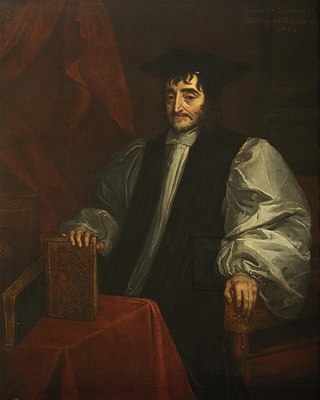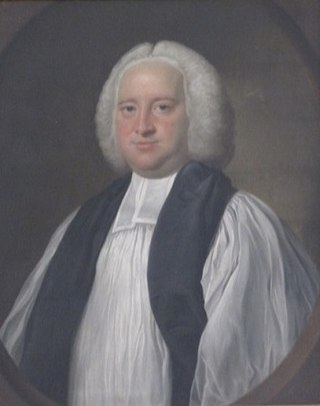Related Research Articles

Sir Frederick Arthur Gore Ouseley, 2nd Baronet was an English composer, organist, musicologist and priest.

Wem is a market town and civil parish in Shropshire, England, 9 miles (14 km) north of Shrewsbury and 9 miles (14 km) south of Whitchurch.

Samuel Butler was an English classical scholar and schoolmaster of Shrewsbury School, and Bishop of Lichfield. His grandson was Samuel Butler, the author of the novel Erewhon.

George Morley, was a senior member of the Church of England from London, who served as Bishop of Worcester from 1660 to 1662, and of Winchester from 1662 to 1684.

Thomas Dudley Fosbroke FSA was an English clergyman and antiquary. He was curate of Horsley, Gloucestershire, until 1810 and then of Walford in Herefordshire. He wrote British Monachism, an examination of English monastic life, as well as the Encyclopaedia of Antiquities (1824) and its sequel, Foreign Topography (1828). He was an important historian of Gloucester, writing two volumes on the history of that city.

Rev. John Thorneycroft Hartley was a tennis player from England, and the only clergyman to win Wimbledon.

Great Ness and Little Ness are civil parishes in Shropshire, England.

Richard Newport, 2nd Earl of Bradford PC, styled The Honourable from 1651 to 1694 and subsequently Viscount Newport until 1708, was an English peer and Whig politician.

Francis Newport, 1st Earl of Bradford PC, styled The Honourable between 1642 and 1651, was an English soldier, courtier and Whig politician.
Richard Newport, 1st Baron Newport was an English landowner and politician who sat in the House of Commons at various times between 1614 and 1629. He supported the Royalist cause in the English Civil War and was created Baron Newport in 1642.

Gerard Trower was an Anglican bishop.

James Johnson was an English prelate, successively Bishop of Gloucester (1752–1759) and of Worcester (1759–1774).
Robert Harris (1581–1658) was an English clergyman, known as a Puritan preacher, member of the Westminster Assembly, and President of Trinity College, Oxford.

Samuel Fell D.D. was an English academic and clergyman, Dean of Christ Church, Oxford and Vice-Chancellor of the University of Oxford during the First English Civil War.

The Rt Rev William Hart Coleridge was the first Bishop of Barbados from 1824 until 1842.

Thomas Vowler Short was an English academic and clergyman, successively Bishop of Sodor and Man and Bishop of St Asaph.
John Bromley was an English clergyman, Catholic convert, and translator.

Thomas Adams School is a coeducational secondary school, boarding school and sixth form in Wem, Shropshire, England. The school takes pupils from ages 11–18 and currently has just over 1,300 on roll. The school has the Schools for Health Award and in 2002 obtained Media Arts College status.The school is located on a 30 acre site split across 2 campuses which are connected. The Lowe Hill site is the location of the secondary school (11-16) whilst the Noble Street site is the location for the sixth form and adjacent boarding houses. The boarding house can accommodate up to 65 students and is one of only 32 state boarding schools in England.
John Banks Jenkinson was an English bishop who was the Bishop of St David's from 1825.
Thomas Warmestry was Dean of Worcester from 1661 until his death.
References
- Attribution
![]() This article incorporates text from a publication now in the public domain : Wroth, Warwick William (1889). "Garbet, Samuel". In Stephen, Leslie (ed.). Dictionary of National Biography . Vol. 20. London: Smith, Elder & Co. pp. 403–404.
This article incorporates text from a publication now in the public domain : Wroth, Warwick William (1889). "Garbet, Samuel". In Stephen, Leslie (ed.). Dictionary of National Biography . Vol. 20. London: Smith, Elder & Co. pp. 403–404.